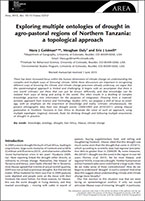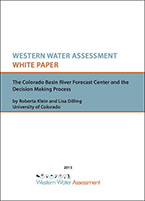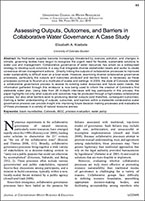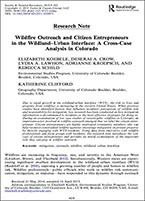CENTER Publications
Below is a sample of recent publications by CSTPR faculty (CSTPR authors bolded):
 Communicating Mega-Projects in The Face Of Uncertainties: Israeli Mass Media Treatment of the Dead Sea Water Canal Communicating Mega-Projects in The Face Of Uncertainties: Israeli Mass Media Treatment of the Dead Sea Water Canal
by Itay Fischhendler, Galit Cohen-Blankshtain, Yoav Shuali, and Maxwell Boykoff, Public Understanding of Science, October, vol. 24 no. 7, 794-810, 2015
Abstract: Given the potential for uncertainties to influence mega-projects, this study examines how mega-projects are deliberated in the public arena. The paper traces the strategies used to promote the Dead Sea Water Canal. Findings show that the Dead Sea mega-project was encumbered by ample uncertainties. Treatment of uncertainties in early coverage was dominated by economics and raised primarily by politicians, while more contemporary media discourses have been dominated by ecological uncertainties voiced by environmental non-governmental organizations. This change in uncertainty type is explained by the changing nature of the project and by shifts in societal values over time. The study also reveals that ‘uncertainty reduction’ and to a lesser degree, ‘project cancellation’, are still the strategies most often used to address uncertainties. Statistical analysis indicates that although uncertainties and strategies are significantly correlated, there may be other intervening variables that affect this correlation. This research also therefore contributes to wider and ongoing considerations of uncertainty in the public arena through various media representational practices. Read more ... |
| |
 Environmental Rulemaking Across States: Process, Procedural Access, and Regulatory Influence Environmental Rulemaking Across States: Process, Procedural Access, and Regulatory Influence
by Deserai A. Crow, Elizabeth A. Albright, and Elizabeth Koebele, Environment and Planning C: Government and Policy, DOI: 10.1177/0263774X15606922, 2015
Abstract: Rulemaking is central to policymaking in the United States. Additionally, regulatory authority is devolved to the states in many instances. However, our knowledge of state-level rulemaking is not as advanced as that related to federal rulemaking. To advance the scholarship on state rulemaking, this study compares environmental rulemaking across three environmental issues (renewable portfolio standards, concentrated animal feeding operation regulations, and hydraulic fracturing disclosure rules) in five states (California, Colorado, Michigan, North Carolina, and Pennsylvania) to understand procedural and stakeholder participation commonalities among the cases. Using data from public rulemaking documents, stakeholder comment during rulemaking, and in-depth interviews with agency staff and stakeholders, the findings suggest that there are common patterns of pre-process informal stakeholder consultation, public comment and outreach mechanisms, and corollary issues related to stakeholder access across these cases. These findings advance our knowledge of state-level rulemaking as it relates to public input and procedural equity for stakeholders. Read more... |
| |
 Information, Resources, and Management Priorities: Agency Outreach and Mitigation of Wildfire Risk in the Western United States Information, Resources, and Management Priorities: Agency Outreach and Mitigation of Wildfire Risk in the Western United States
by Deserai A. Crow, Lydia A. Lawhon, Elizabeth Koebele, Adrianne Kroepsch, Rebecca Schild, and Juhi Huda, Risk, Hazards & Crisis in Public Policy, Vol. 6, No. 1., 2015
Abstract: States in the American West are experiencing significant population growth and exurban development, in addition to a longer fire season and a changing climate. These factors contribute to the increasing difficulty of managing wildfire in the Wildland-Urban Interface. Using data collected through a survey of fire professionals, this research investigates the strategies that agencies use to promote wildfire mitigation on private property within the WUI, fire professionals’ sense of the effectiveness of those strategies, and support among fire professionals for various regulatory approaches to wildfire mitigation. The findings indicate that fire professionals are keenly aware of the constraints imposed by the political context and acceptability of some tools that they could use to promote more aggressive mitigation on private property. Recommendations based on these findings suggest that fire professionals should consider capitalizing on citizen network approaches to outreach in order to build trust between agency personnel and homeowners and to cope with limited support for regulatory mandates for wildfire mitigation. Read more..
|
| |
 Catching Fire? Social Interactions, Beliefs, and Wildfire Risk Mitigation Behaviors Catching Fire? Social Interactions, Beliefs, and Wildfire Risk Mitigation Behaviors
by Katherine Dickinson, Hannah Brenkert-Smith, Patricia Champ, and Nicholas Flores, Society & Natural Resources, Volume 28, Issue 8, 2015
Abstract: Social interactions are widely recognized as a potential influence on risk-related behaviors. We present a mediation model in which social interactions (classified as formal/informal and generic/fire-specific) are associated with beliefs about wildfire risk and mitigation options, which in turn shape wildfire mitigation behaviors. We test this model using survey data from fire-prone areas of Colorado. In several cases, our results are consistent with the mediation hypotheses for mitigation actions specifically targeting vegetative fuel reduction. Perceived wildfire probability partially mediates the relationship between several interaction types and vegetative mitigation behaviors, while perceptions of aesthetic barriers and lack of information play a mediating role in the case of fire-specific formal interactions. Our results suggest that social interactions may allow mitigation and prevention behaviors to “catch fire” within a community, and that wildfire education programs could leverage these interactions to enhance programmatic benefits. Read more... |
| |
 Exploring Multiple Ontologies of Drought in Agro-Pastoral Regions of Northern Tanzania: A Topological Approach Exploring Multiple Ontologies of Drought in Agro-Pastoral Regions of Northern Tanzania: A Topological Approach
by Mara J. Goldman, Meaghan Daly, and Eric J. Lovell, Area, 10.1111/area.12212, July 24, 2015
Abstract: There has been increased focus within the human dimensions of climate change on understanding the complex and multiple ways of ‘knowing’ climate. While these discussions are important in recognising different ways of knowing the climate and climate change processes already underway, we argue that this epistemological approach is limited and challenging. It begins with an assumption that there is one world (climate) out there that can just be known differently, and that knowledge can be isolated from ways of being and acting in the world. This often results in a distilling of complex knowledge practices into information for the purposes of integration. Drawing from a material-semiotic approach from Science and Technology Studies (STS), we propose a shift of focus to ontology, with an emphasis on the enactment of knowledge and reality (climate) simultaneously. We present ethnographic data from two drought events (2008/2009 and 2010/2011) among Maasai pastoralists in Northern Tanzania in East Africa to illustrate the value of such an approach, using multiple topologies (regional, network, fluid) for thinking through and following multiple enactments of drought in practice. Read more... |
| |
 The Colorado Basin River Forecast Center and the Decision Making Process The Colorado Basin River Forecast Center and the Decision Making Process
by Roberta Klein and Lisa Dilling, Western Water Assessment White Paper, 2015
This study investigated characteristics of the users or potential users of Colorado Basin River Forecast Center (CBRFC) forecasts and their decision making contexts, and analyzed the utility of a Western Water Assessment project quantifying the contribution of tree death due to bark beetle infestation along with desert dust deposition on snowpack on streamflow. Read more... |
| |
 Assessing Outputs, Outcomes, and Barriers in Collaborative Water Governance: A Case Study Assessing Outputs, Outcomes, and Barriers in Collaborative Water Governance: A Case Study
by Elizabeth Koebele, Journal of Contemporary Water Research and Education, 155, 63-72, 2015
Abstract: As freshwater supplies become increasingly threatened by overuse, pollution, and changes in climate, governing bodies have begun to recognize the urgent need for flexible, sustainable solutions to water use and management. Collaborative governance of water resources has arisen as a widespread strategy to develop such solutions in a way that integrates diverse stakeholder needs and works to create consensus-driven management actions. Directly linking the outputs of collaborative processes to improved water sustainability is difficult even on a local scale. However, examining diverse collaborative governance processes, particularly the outputs and outcomes produced and barriers faced, is necessary as these processes continue to flourish at a multitude of scales and settings. In 2005, the state of Colorado initiated a collaborative governance process to assess its existing water resources and future water needs; the information gathered through this endeavor is now being used to inform the creation of Colorado’s first statewide water plan. Using data from 28 in-depth interviews with key participants in this process, this paper highlights not only what outputs and outcomes may be produced through a high-stakes collaborative process, but also what barriers exist to producing desired outputs (and therefore, consequent outcomes). Read more... |
| |
 Wildfire Outreach and Citizen Entrepreneurs in the Wildland-Urban Interface: A Cross Case Analysis in Colorado Wildfire Outreach and Citizen Entrepreneurs in the Wildland-Urban Interface: A Cross Case Analysis in Colorado
by Elizabeth Koebele, Deserai A. Crow, Lydia A. Lawhon, Adrianne Kroepsch, Rebecca Schild, and Katherine Clifford, Society & Natural Resources, July 13, 2015
Abstract: Due to rapid growth in the wildland-urban interface (WUI), the risk to lives and property from wildfires is increasing in the western United States. While previous studies have identified factors that influence residents’ perceptions of wildfire risk and responsibility for mitigation, less research has been conducted on how mitigation information is disseminated to residents or the most effective strategies for doing so. During an examination of two case studies of catastrophic wildfires in Colorado, an important actor involved in wildfire outreach emerged that we label the citizen entrepreneur. Citizen entrepreneurs are highly motivated community members who can help resource-constrained wildfire agencies encourage mitigation on private property by directly engaging with WUI residents. Using data from interviews with wildfire professionals and focus groups with residents, this research note introduces the concept of citizen entrepreneurs and provides an initial examination of the important role they can play in wildfire outreach. Read more... |
